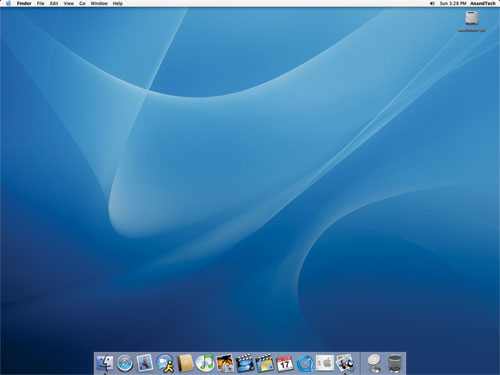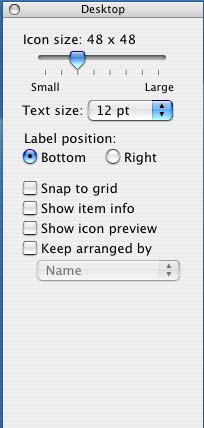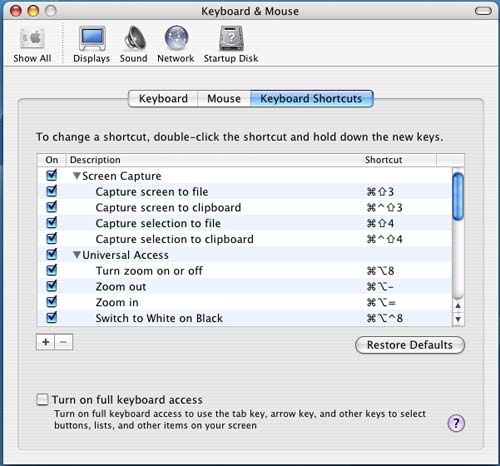A Month with a Mac: A Die-Hard PC User's Perspective
by Anand Lal Shimpi on October 8, 2004 12:05 AM EST- Posted in
- Mac
Finding my way around Finder
The OS X desktop is clearly different from what I was used to under XP. For starters, all of the icons have been moved to the right side of the screen; and where I was used to seeing a taskbar, there was this little translucent "dock" with a bunch of icons in it.
The OS X desktop and features, such as icon size, dock size and animations, are easily customizable.
Click to enlarge.
Under Windows, there is Explorer. It is the application that not only exists as a way of browsing your file system, but also as the "desktop" itself; the OS X equivalent? Finder. I don't think that I have to point out the similarity in the names. Yes, one company copied (or poked fun at) another.
My first reaction was that the icons on the desktop were far too large; indeed, they are, if you put them on a Windows desktop - but for some reason, they end up looking strange if you make them smaller. One of the biggest features of OS X is the ability to customize just about every aspect of the OS; I didn't like the size of the icons at first, so I simply changed the icon size through the "view options" menu. Although it's easy to talk about now, I had to ask how to do it online before I ever discovered the option - also the case with the majority of OS X, most of the power and customization of the OS remains hidden. I quickly realized that although Apple had targeted the entry level computer user with the interface of OS X, the OS was far more tailored to the power user in my opinion.

Where to start? Customization is much more possible (and easy to do) under OS X than any variant of Windows that I have ever encountered. Icon sizes are just the beginning; through the view options menu alone, you can change the positioning of the labels on the icons, the text size as well as the normal array of Windows options. And any changes you make here occur in real time - no clicking "OK" or "Apply". Just check a box and it happens instantaneously; and uncheck it, and everything goes back to normal. It's a small thing, but as I soon found out, much of OS X's appeal to me came in tiny gems like this.
The other thing to point out, which is quite possibly the biggest draw to OS X for me, is the fact that just about everything under OS X has a keyboard shortcut associated with it. I've found that if you got your start with PCs in the DOS days, then you end up being much more of a keyboard junkie than someone who is reliant on the mouse. I use the mouse when I have to, but when it's quicker to use the keyboard, I feel much more comfortable firing off a few keystroke combinations to get my point across. If you are anything like me in that respect, then OS X will be your playground.
I can't possibly list all of the keystroke combinations that I use on a daily basis, but there are quite a few. For example, I am a big "ALT-TAB"-er in Windows, but ALT-TAB is only really useful for switching applications, not closing them. The ALT-TAB equivalent under OS X, Command-TAB (the Command key is positioned where you'd expect ALT to be, so it works out fine), works similarly, but here's the catch - hit "Q" while you've selected an application and it will quit automatically. Nice, but nothing major right?
Want to minimize a window? Command-M will take care of that. Want to hide an application without minimizing it? Command-H. Hidden windows will automatically move to the end of the Command-TAB list, so you don't switch to them after you've hidden them.
Want to open a new Finder window? Command-N. Want to create a new folder on your drive? Shift-Command-N. I've always wanted to be able to create new folders in Explorer without using the mouse. OS X was a dream come true in that respect.
OS X will even let you define your own keyboard shortcuts for any application through the keyboard preferences panel:

Not impressed? Not a keyboard junkie? Then Finder is just as capable and as usable as Explorer. No big win for Apple there, but maybe a draw. For me, the little things are what intrigued me, but I'll admit - not everyone is as easily amused!
There is one aspect of the keyboard shortcut support that OS X does fall behind on, and that is support for keyboard shortcuts in dialog boxes. In some dialog boxes, hitting Command and the letter of the option you want to select will work, but in others, it will not. Furthermore, finding out the correct key to hit to select the option that you want is most definitely a guessing game, as there are no underlined characters or anything indicating what key to hit. Given OS X's strong support for keyboard shortcuts, this shortcoming (no pun intended) is puzzling.










215 Comments
View All Comments
fxparis - Wednesday, October 13, 2004 - link
FinalFantasy also wrote in #151: " a lot a stupidities "it doesn't matter for him. but please FinalWhoever don't misinform people that need fair information to make their choice ! specially when it come to audio video pro
some young people will make a living from it. and they'll make a better living if they choose Mac since the beginning to work.
it's IMPORTANT !
chrisnorth - Tuesday, October 12, 2004 - link
Regarding post #172 by Digstra, RIGHT ON! I think you have said, eloquently, what I was thinking. Of course, an open mind means that people need to recognize the good and the bad; nothing is perfect including OS X and the Mac. Having said all that, using XP may be subjecting yourself to unnessissary torture :-)melgross - Tuesday, October 12, 2004 - link
Student/Teacher Office for the Mac sells for $135-150, and you don't have to show that you are anything other than willing to pay for it.About security. While I completely agree with those who say that we should all get a router, firewall, virus protection, and several spy-ware prevention programs, it just doesn't work for the average person.
When I help someone with a PC who has a seriously infected machine, I find several things of interest.
Most have an anti-virus program, but have let their subscription lapse. When I mention this, they get angry about the idea that they should HAVE to pay for a subscription. They feel as though they shouldn't have to pay for something on a yearly basis to use something that they have already bought.
The idea of getting two or three anti-spy-ware programs is also something that they can't understand, or like. When I explain that even having these programs doesn't mean that they won't still get infected, even though the probability is much less, they are bewildered. They don't WANT to understand that they have to be proactive about these problems.
They just want to use their machines.
If you rarely buy anything, go to obscure sites (and with the new fly-by trojans...), not open e-mails, etc., you won't likely get infected. I suspect that those who have all of the protections, and claim to never get infected, don't really do as much as they have us think they do. I don't see Anand web surfing frivolously, downloading questionable files from newsgroups, and subscribing to porno sites etc.
Most people do at least some of those things.
No matter how you look at it, OS X is far more secure, for the average person, than XP. If we all played by the rules, and Microsoft did the right thing, it might be different.
One reason that SP 2 is having as many problems as it has been, is because even though it's got a number of services turned off by default, when you use .net, or need certain services from office etc. they have to be turned on again. OS X doesn't need most of those services to accomplish the same things. FreeBSD is also one of the most secure UNIX variants. Linux, by the way, is turning out to be not that much more secure than XP is, going by all of the successful exploits reported.
Digsa - Tuesday, October 12, 2004 - link
Just wanted to say that - as a long-time Mac user - I really respected this article for its honesty of approach. I was really impressed. While of course I might quibble here and there about some things (Windows security, adware and virus issues were strangely absent;-)) I can genuinely trust the writer's attempts at balance, and I give his opinions the weight they deserve. he's done a fine job.At the moment I am travelling in the opposite direction to the author - I've just started using an XP machine for course work - and this article has helped me to see my experience in a more balanced light. Some of the criticisms he has - and my own criticisms when using XP - are based upon long-established working habits and prejudices. The clever trick is to see through those prejudices to look to the root of the system. What is the system trying to achieve? Does it do it better or worse? Honestly?
OS X is a wonderful system, and I recommend those who haven't looked at it to do so. I'm enjoying the journey of discovery with XP - and trying to keep an open mind when it does something I'm unaccustomed to. However, the best lesson is perspective. If we don't give the other system a proper try, how can we make justified comments upon it. The author of this piece set out to do just that - and the results speak for themselves.
I suppose my one crucial point is this - if we all keep open minds about the possibilities for innovation from different computer systems, and don't let the zealots on both sides take over the asylum, then we are all winners. Because the market in ideas can function without prejudice, and a good technology implementation can be seen for what it is - rather than through the prism of reality distortion fields or slick marketing.
chrisnorth - Tuesday, October 12, 2004 - link
In reply to post #167 by Victor, thanks for the commentary.Yes, I could have been much more specific. So perhaps I should have reworded my thoughts to read "10 most popular software requests" or some such thing. Also, I was playing "Devil's Advocate" to some degree as I believe a somewhat critical eye represents the best approach when you want to improve something.
I agree, Mellel is a first rate word processor and an excellent deal. I've been using it since its early days. I think it cost $19.95 when I purchased it. Instead of BBEdit, I use skEdit, which is reasonably capable and has great potential. As for Filemaker Pro, it is an expensive option as is Keynote, given that they represent the equivalent of only a single module each from the Office suite. Mesa 3 from P&L software is a top rate spreadsheet and at $30.00 a great value.
Hadn't heard of Blogwave Studio. I use the freeware MacJournal, which is an excellent Journal hampered only by its limited functionality. Haven't heard of Quicksilver, and can't use it anyway since I'm waiting for Tiger before upgrading from Jaguar. As for the other suggestions, been there and not terribly impressed generally.
Any other thoughts on great Mac software deals anyone?
victorpanlilio - Tuesday, October 12, 2004 - link
FinalFantasy wrote in #169: Victor...you are a monster...wow... hehe ;DMy 4-1/2 year old son likes to have me pretend I'm one... :-)
I'm just a regular guy who thought he had finally overcome his addiction to discussion forums...not... well, it's better than video lottery terminals, I suppose. Anyhoo, I'll probably wind down my posts because I *really* need to get a life... :-)
If this were a group in physical space and I'd just won at the VLT I'd invite y'all for a round of brewskis... make that a keg, on me. Oops, maybe not everyone here is of drinking age... :-D
Hey Anand, ever tried Stella Artois?
FinalFantasy - Tuesday, October 12, 2004 - link
Victor...you are a monster...wow...hehe ;Dvictorpanlilio - Tuesday, October 12, 2004 - link
Re: inexpensive alternative to MS OfficeIf you really need ALL the functions of Office, the total cost of the apps listed above would exceed the price of Office 2004 for the Mac (C$560 Std, C$700 Pro). So, at this time there seems to be no inexpensive substitute. One avenue you might try is to enrol in a community college course and use student status to purchase Student/Teacher Edition of Office (about C$225), which would allow you to install on up to 3 machines.
victorpanlilio - Tuesday, October 12, 2004 - link
Chris North wrote in #166: How about the top ten most needed apps on the MacTop ten most needed from what perspective? CAD? Web design? Database development? 3D Rendering? Business intelligence? Customer relationship management? Seismic data interpretation? Medical imaging? Small business collaboration?
Anyway, some suggestions based on your list:
Advanced inexpensive OS X native CSS Editor
StyleMaster, http://www.westciv.com/software/index.html
Advanced inexpensive OS X Native XML Editor
Hmm... they all seem to be Java-based, so no go...
However, for text editing, instead of BBEdit, try
TextMate, http://macromates.com/
OS X advanced personal journal with photo and file wells
BlogWave Studio, http://www.littlehj.com/
OS X native advanced but inexpensive alternative to Photoshop
Stone Design Stone Studio, http://www.stone.com/
OS X native advanced but inexpensive alternate to MS Office
Word: Mellel, http://www.redlers.com/
Excel: MarinerCalc, http://www.marinersoftware.com
PowerPoint: Keynote, http://www.apple.com/keynote
Access: FileMaker Pro, http://www.filemaker.com
Oh, and if you're on OS X 10.3, you should try QuickSilver:
http://quicksilver.blacktree.com/
chrisnorth - Monday, October 11, 2004 - link
Further to my last post, here's a thought for Anand: If you are looking for a followup article to do on Macs, how about the top ten most needed apps on the Mac? You could take a poll or something then describe where the biggest deficiencies lie and which apps would best fill them. Maybe, you could help convince a few companies like Jasc, or Xara to port their products.Here is a quick list to start with:
Advanced inexpensive OS X native CSS Editor
Advanced inexpensive OS X Native XML Editor
OS X advanced personal journal with photo and file wells.
OS X native advanced but inexpensive alternative to Photoshop
OS X native advanced but inexpensive alternate to MS Office.
Please no multi-platform java apps.
Just a thought...